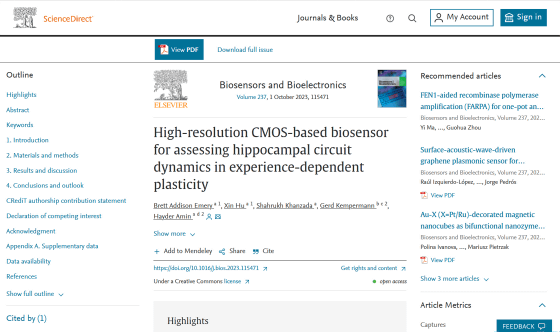Research results that sending a life with diverse experiences boosts brain connectivity

Although we all prefer a more stimulating or calmer life, the type of life we lead can affect brain function. A new German research team, which investigated the brain connectivity of mice raised in different environments, found that ``mice that have been raised in an environment where they can experience various experiences have higher brain connectivity than mice that do not.'' I reported.
High-resolution CMOS-based biosensor for assessing hippocampal circuit dynamics in experience-dependent plasticity - ScienceDirect

DZNE: A Varied Life Boosts the Brain's Functional Networks
https://www.dzne.de/en/news/press-releases/press/a-varied-life-boosts-the-brains-functional-networks
Living a Varied Life Boosts Brain Connectivity in Mice : ScienceAlert
https://www.sciencealert.com/living-a-varied-life-boosts-brain-connectivity-in-mice
The hippocampus is a brain region that plays a central role in spatial and contextual learning and episodic memory, and is strongly affected by neurodegenerative diseases such as Alzheimer's disease. To investigate how life affects the hippocampus, researchers at the German Center for Neurodegenerative Diseases and Dresden University of Technology conducted experiments to examine the hippocampus of mice raised in different environments.
First, the research team randomly assigned 6-week-old mice to a ``group raised in a normal environment (control group)'' and a ``group raised in an environment where they can have a rich experience (experimental group)''.
Mice in the control group were housed in sets of four in standard mouse cages and provided with adequate nest material, food, and water. On the other hand, the mice in the experimental group were housed in sets of eight in larger cages, and were given toys that changed their placement, maze-like plastic tubes, tunnels, abundant nesting materials, and plenty of food and water. thing.

After raising the mice in their respective environments until they were 12 weeks old, the research team used a
The figure below shows the brain activity in mice in the control group on the left, and the brain activity in mice in the experimental group on the right. It can be seen that the mice in the experimental group had more active brain activity.

'The results far exceeded our expectations,' said Haider Amin, a biomedical engineer at the German Center for Neurodegenerative Diseases. 'No matter what parameter you look at, the richer experience literally heightened the connectivity of neuronal networks. 'This suggests that living our lives shapes our brains on an entirely new basis.'
Gerd Kempermann, co-author of the paper and a neuroscientist at the German Center for Neurodegenerative Diseases, said that previous studies on the effects of activity on brain connectivity used techniques such as single electrodes and MRI. They claim that their method has much higher spatial and temporal resolution. 'Here you can literally see circuits working at the scale of a single cell.'
Although this study only focused on mice, the research team believes that understanding how life experiences change brain connectivity will help identify the causes of brain dysfunction and develop treatments. is thinking.
Related Posts:
in Science, Posted by log1h_ik







